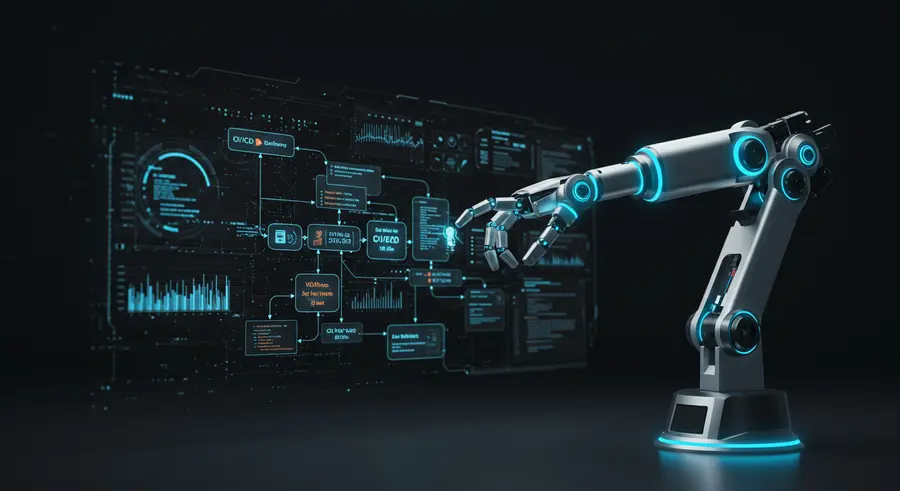Appearance

Welcome, fellow developers and tech enthusiasts! 👋 Today, we're diving deep into a topic that's rapidly transforming the landscape of software development: AI-Driven Automation in CI/CD (Continuous Integration/Continuous Delivery). In an era where speed, reliability, and efficiency are paramount, integrating Artificial Intelligence into our CI/CD pipelines isn't just a luxury—it's becoming a necessity.
You might already be familiar with the fundamentals of CI/CD, perhaps even having explored implementing a CI/CD pipeline with GitHub Actions. But what happens when we infuse these robust pipelines with the intelligence of AI? The answer is a paradigm shift, enabling more proactive, predictive, and potent delivery processes.
Why AI in CI/CD? 🤔
Traditional CI/CD pipelines, while incredibly effective, often rely on predefined rules and manual configurations. This can lead to:
- Reactive Issue Resolution: Problems are detected after they occur, requiring manual intervention.
- Suboptimal Resource Utilization: Builds and tests might consume more resources than necessary due to fixed allocations.
- Limited Predictive Capabilities: Difficulty in foreseeing potential bottlenecks or failures before they impact development.
Enter AI! By leveraging machine learning algorithms, AI can analyze vast amounts of data generated throughout the development lifecycle—from code commits and test results to deployment logs and production metrics. This analysis allows AI to:
- Predict Failures: Identify patterns that often lead to build breaks or test failures, flagging potential issues even before they fully manifest.
- Optimize Resource Allocation: Dynamically adjust computational resources for builds and tests based on historical data and current demand, leading to cost savings and faster feedback cycles.
- Automate Debugging and Triage: Suggest root causes for failures and even recommend fixes, significantly reducing the time spent on debugging.
- Enhance Security Scanning: Go beyond static rule-based security checks to detect subtle anomalies and potential vulnerabilities in real-time.
- Intelligent Test Selection: Prioritize and select the most relevant tests to run based on code changes, reducing overall testing time without compromising quality.
How Does AI Integrate into the CI/CD Pipeline? 🛠️
Let's explore some practical applications of AI in different stages of the CI/CD pipeline:
1. Automated Code Review and Quality Analysis 🤖
AI-powered tools can analyze code for adherence to coding standards, identify potential bugs, and even suggest refactorings.
- Example: An AI linter can learn from successful code patterns and suggest improvements beyond what a traditional linter might catch, or automatically enforce consistent code styles across a large team.
2. Smart Test Orchestration and Optimization 🧠
AI can intelligently decide which tests to run, in what order, and even generate new test cases.
- Scenario: After a small change to a specific microservice, an AI system can analyze the impact and only trigger relevant integration and end-to-end tests, instead of running the entire test suite.
- Example for
implementing-a-ci-cd-pipeline-with-github-actions: Imagine a GitHub Actions workflow that, instead of running all Cypress tests on every push, uses an AI model to analyze the committed changes. If the changes are confined to the UI components, the AI might suggest running only UI-related Cypress tests, skipping backend API tests, thus significantly speeding up the feedback loop.
yaml
# .github/workflows/ai-optimized-ci.yml
name: AI-Optimized CI
on:
push:
branches:
- main
pull_request:
branches:
- main
jobs:
build-and-test:
runs-on: ubuntu-latest
steps:
- uses: actions/checkout@v3
- name: Set up Node.js
uses: actions/setup-node@v3
with:
node-version: '18'
- name: Install dependencies
run: npm install
- name: Determine relevant tests (AI-powered hypothetical)
id: ai_test_selection
run: |
# In a real-world scenario, this would involve an AI service call
# that analyzes commit history and code changes to determine which
# test suites are most relevant.
# For demonstration, let's assume it detects changes affecting 'frontend'
if grep -q "frontend" <<< "${{ github.event.head_commit.message }}"; then
echo "RUN_UI_TESTS=true" >> $GITHUB_ENV
else
echo "RUN_UI_TESTS=false" >> $GITHUB_ENV
fi
- name: Run unit tests
run: npm test
- name: Run UI tests (conditionally AI-selected)
if: env.RUN_UI_TESTS == 'true'
run: npm run cypress:run # Or your command for UI testsNote: The determine relevant tests step above is a simplified placeholder. In a real AI-driven pipeline, this would involve integrating with a dedicated AI service or a custom ML model that analyzes code changes and test dependencies.
3. Predictive Deployment and Rollbacks 📈
AI can monitor production metrics and suggest optimal deployment times or trigger automatic rollbacks if anomalies are detected post-deployment.
- Use Case: An AI system observes a sudden spike in error rates or latency immediately after a new deployment. It can automatically initiate a rollback to the previous stable version, minimizing downtime and user impact.
4. Anomaly Detection and Security 🔒
AI excels at identifying unusual patterns that might indicate security breaches or performance degradation.
- Application: AI can continuously analyze network traffic and application logs to detect subtle deviations from normal behavior, alerting teams to potential attacks or system failures before they escalate.
The Future is Intelligent CI/CD 🌟
The integration of AI into CI/CD is not about replacing human developers but augmenting their capabilities. It's about building smarter, more resilient, and ultimately more efficient software delivery pipelines. This allows developers to focus on innovation and complex problem-solving, while AI handles the repetitive, data-intensive tasks.
As AI technologies continue to mature, we can expect even more sophisticated applications in CI/CD, leading to fully autonomous and self-optimizing development workflows. Embracing these advancements is crucial for staying competitive and delivering high-quality software at an unprecedented pace.
What are your thoughts on AI in CI/CD? Share your insights and experiences! 👇